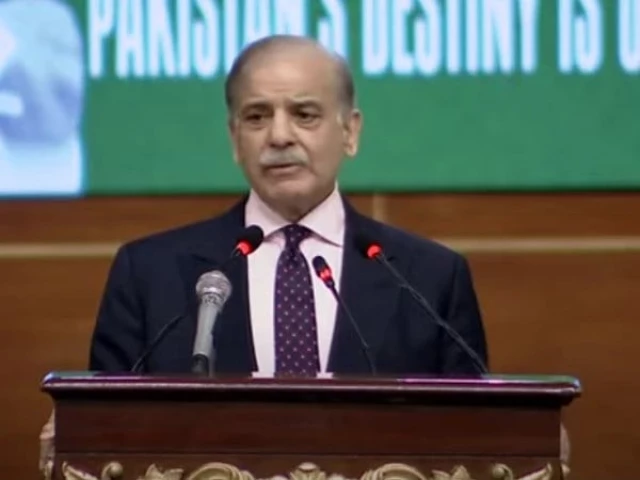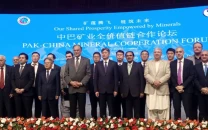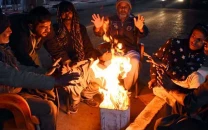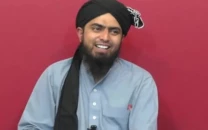Centre, provinces to push unified anit-terror narrative
Awareness about terrorism to be included in national curriculum

Prime Minister Shehbaz Sharif has directed the federal and provincial governments to "forcefully" implement "a unified response and narrative" against the ongoing wave of terrorism as well as anti-Pakistan and anti-institutions, it emerged on Friday.
The prime minister's directions to collectively counter the ongoing threat of terrorism and ant-state narratives in the country has come on the heels of Chief of Army Staff (COAS) Gen Syed Asim Munir's recent statement, emphasising to transform Pakistan into a "hard state" from a "soft state".
The decision to forcefully implement the government's narrative was taken during a meeting of a sub-committee of the National Action Plan (NAP), chaired by Prime Minister Shehbaz at the Prime Minister House on March 27.
The meeting was attended by Federal Minister for Information Attaullah Tarar, Minister for Law Azam Nazeer Tarar, provincial as well as Azad Kashmir and Gilgit-Baltistan information ministers, second-tier military leadership, secretary interior and other officials.
Sources said Sindh's minister for information Sharjeel Inam Memon and Punjab's information minister Azma Bukhari were present in person, while Khyber-Pakhtunkhwa Chief Minister's Adviser on Information Barrister Saif and a representative from the Balochistan government joined the meeting via video link.
According to the sources, the federal information minister gave a detailed briefing on the recent incidents of terrorism and urged the participants to send a strong and unified message to the anti-state actors and their sympathisers from the federal to the provincial levels.
While briefing the participants on recent attacks on Jaffer Express in Balochistan, the sources said, the information minister said that a Baloch activist, Mahrang Baloch, along with roughly 2,000 people had allegedly barged into a hospital, tried to stop the officials from conducting post-mortem and demanded of the hospital officials to handover the bodies without ascertaining the identities of the deceased.
The meeting was told that she was arrested in connection with the hospital incident. Sources said that the information minister told the participants that the bodies at the hospital were of the terrorists, who were killed in the Jaffer Express attack.
"No one asks them why they didn't condemn such a huge incident," a participant of the meeting shared, "instead, they tried to back the terrorists." He said that "a unified government response" should be conveyed to masses, separating facts from fiction and highlighting how people were being misled.
"The meeting decided to forcefully implement government's narrative," said a source, adding that it was agreed that no leniency would be shown to the terrorists and their sympathisers. They also agreed that cooperation among federal, provincial, Gilgit Baltistan and Azad Kashmir governments should be enhanced to strengthen national security, and give a strong and unified response to terrorists.
The prime minister-led committee also decided to spread government's narrative through mainstream and digital media, saying that an effective strategy should be devised to counter 'fake news' on social medial platforms. It was also decided to include awareness about terrorism in the national curriculum.
On March 18, the Parliamentary Committee on National Security approved a unanimous declaration, reaffirming Pakistan's unwavering commitment to eradicating terrorism in all forms and vowed a decisive action against elements threatening national stability.
During the meeting on the national security, it was reported that the army chief had said that Pakistan had to become a "hard state" to fight militancy and asked how long would countless lives be sacrificed in a soft state, and how long would governance gaps be filled by the blood of soldiers and martyrs.
The country's top civil and military leadership had reaffirmed its commitment in the first security meeting in parliament during the incumbent PML-N-led coalition government, which was boycotted by the key opposition party, the Pakistan Tehreek-e-Insaf (PTI), among others.
The committee had reiterated that no institution, individual or group, acting in collusion with hostile forces, would be allowed to undermine Pakistan's peace and stability. Expressing regret over the absence of some opposition members, an official statement had said that the committee reaffirmed that consultations on this matter would continue.
During the in-camera session, the military leadership had provided a detailed briefing on the prevailing security situation, particularly in Balochistan and K-P. The meeting was also informed about the ongoing counterterrorism operations, recent threats and the state's comprehensive strategy to ensure internal security.
The meeting of the Parliamentary Committee on National Security was called after security concerns escalated following a string of attacks, particularly in Balochistan, where militants recently hijacked a passenger train and carried out suicide bombing on a convoy.
Earlier, terrorists had attacked on Bannu Cantonment in K-P where 16 terrorists were killed and five soldiers were martyred. Also, Jamiat Ulema-e-Islam-Sami (JUI-S) leader Maulana Hamidul Haq was among six people perished in a recent suicide attack at in Nowshera district of K-P.
Following the meeting on national security, PML-N Senator Irfan Siddiqui, while emphasising that terrorists could not be allowed to roam freely and take innocent lives without facing consequences, said that no major military operation was currently under way but the state had the authority to act wherever necessary to eliminate terrorism.




















COMMENTS
Comments are moderated and generally will be posted if they are on-topic and not abusive.
For more information, please see our Comments FAQ